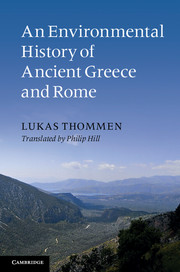Book contents
- Frontmatter
- Contents
- Figures
- Preface
- Introduction
- Part I Greece
- Chapter 1 The geographic space
- Chapter 2 People and nature
- Chapter 3 Agriculture
- Chapter 4 Forests and timber
- Chapter 5 Gardens
- Chapter 6 Animals
- Chapter 7 Food
- Chapter 8 Fire and water
- Chapter 9 Earthquakes and volcanoes
- Chapter 10 Mining
- Part II Rome
- Chronology
- Further reading
- Sources
- Bibliography
- Index
Chapter 6 - Animals
Published online by Cambridge University Press: 05 June 2012
- Frontmatter
- Contents
- Figures
- Preface
- Introduction
- Part I Greece
- Chapter 1 The geographic space
- Chapter 2 People and nature
- Chapter 3 Agriculture
- Chapter 4 Forests and timber
- Chapter 5 Gardens
- Chapter 6 Animals
- Chapter 7 Food
- Chapter 8 Fire and water
- Chapter 9 Earthquakes and volcanoes
- Chapter 10 Mining
- Part II Rome
- Chronology
- Further reading
- Sources
- Bibliography
- Index
Summary
Animals – cattle, goats, pigs, deer, sheep, poultry, birds, fish – were a part of the food supply in antiquity, but also provided other raw materials such as wool, leather and fur. Horses, mules, oxen, elephants and camels also served as means of transport and conveyance, particularly in war. Animals were thus the companions, servants and guardians of people, and at the same time a means of entertainment and prestige in spectacles and at the hunt. Finally, they were used as sacrificial offerings to the gods, whose will was divined by observation of birds – the Roman auspices – or by the reading of entrails.
Animal husbandry was the foundation of rural subsistence. In early Greece, the stock of animals was initially a greater determinant of wealth than landholding. Cattle were of the greatest economic importance, both as draught animals and as suppliers of meat and leather. Sheep, which were also held in large numbers, provided milk and wool. Together with cereals, the meat of sheep, goats and pigs formed the foundation of the diet. Dogs served as protectors and companions, particularly on the hunt; the close relationship between them and their masters is often shown expressively on grave steles.
- Type
- Chapter
- Information
- An Environmental History of Ancient Greece and Rome , pp. 45 - 48Publisher: Cambridge University PressPrint publication year: 2012



